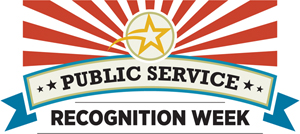The NRC Celebrates Public Service Recognition Week
Posted by on May 4, 2015
 Public Service Recognition Week
has been celebrated the first week of May since 1985. It’s a time set
aside to honor the men and women who serve our nation as federal, state,
county and local government employees. In honor of this week, we bring
you a Q&A with Dan Dorman. He is representative of the more than
3,000 employees of the NRC who are dedicated to their job – and good at
what they do.
Public Service Recognition Week
has been celebrated the first week of May since 1985. It’s a time set
aside to honor the men and women who serve our nation as federal, state,
county and local government employees. In honor of this week, we bring
you a Q&A with Dan Dorman. He is representative of the more than
3,000 employees of the NRC who are dedicated to their job – and good at
what they do.Q. What does your job entail and how long have you been in federal service?
A. I am the Regional Administrator for NRC’s Region I office in Pennsylvania. We oversee safety and security at 25 nuclear reactors in the Northeast and more than 900 nuclear materials licensees in the eastern United States. I’ve been with the NRC for 24 years in various roles, most recently as deputy director of the operating reactors office in headquarters and before that as deputy director of the nuclear materials office. Over the years, I’ve served in reactor licensing and oversight, engineering research, nuclear security, and fuel facility licensing and oversight. Before joining the NRC in 1991, I served as a nuclear submarine officer in the U.S. Navy for almost a decade.
Q. Why did you decide to go into federal government service?
A. My degree is in naval architecture and marine engineering; I joined the Navy out of college to get operational experience that I felt would enhance my skills. I left the Navy for work-life balance and came to the NRC to apply the nuclear power knowledge and skills that I had gained through my Navy service.
Q. Over the years , what has kept you interested in your job and willing to stay in federal service?
A. When I first came to the NRC, I had no intention of staying this long. The main reasons I have are the mission and the people. During the first decade I was at the NRC, the agency reduced from roughly 3300 to 2700 staff and opportunities for promotion were rare, but as I got engaged in our public health and safety mission and came to realize the caliber and engagement of the people I was working with, my sense of family and dedication to the mission made my career choice clear.
Q. What would you consider to be one of your greatest challenges while working for the NRC?
A. I have become fascinated with people (which is a big deal for an engineer!). A lot of times our biggest challenges are working with people who have shared goals (e.g., public health and safety, common defense and security) but differing visions of how best to achieve those goals. Working security and incident response issues with other federal agencies after the 9/11 terrorist attacks and working with international counterparts to enhance nuclear safety worldwide following the Fukushima accident are great examples. We all have a passion to make it better, but the hard work is in listening to each other’s ideas and not jumping ahead to drive to your own preconceived conclusions. In the end, if we can hear each other out, we end up with a stronger and more sustainable path forward.
Q. What would you consider to be one of your greatest work accomplishments?
A. It was a tremendous privilege to be part of the NRC’s Near-Term Task Force on Fukushima lessons learned in 2011. The team we put together had tremendous diversity of experience and perspective. In 90 days we had time to engage senior NRC staff to explore a broad range of issues arising from the accident even as news continued to come in daily from Japan. We did not have time or the tasking for public engagement. Still, we produced a report and recommended actions that have stood the test of time. The most important safety improvements have already been completed at many nuclear power plants and will be completed at all of them by the end of next year, and our recommendations have served as a model for other nuclear safety regulators all over the world.
Q. What would you like the public to know about federal employees, that perhaps they don’t know?
A. We are your neighbors and active participants in your community. The people I work with have exceptional skills and experience and are highly motivated by our mission to protect people and the environment. We’re also active members of our communities, giving back in many ways well beyond our jobs. We give generously to help those less fortunate, we organize blood drives, we do outreach in our schools to help encourage our young people to develop their skills and be engaged citizens. Beyond our careers and our mission, we are working every day to make the world a better place, now and for the future.


No comments:
Post a Comment